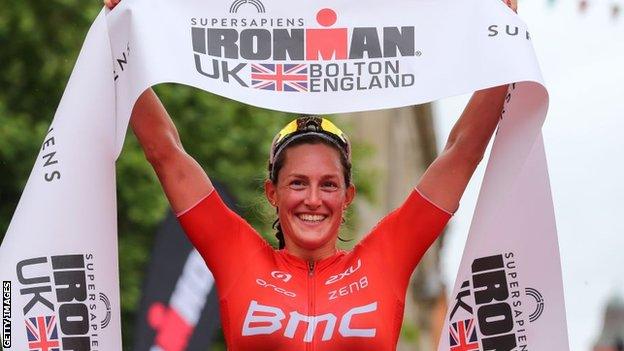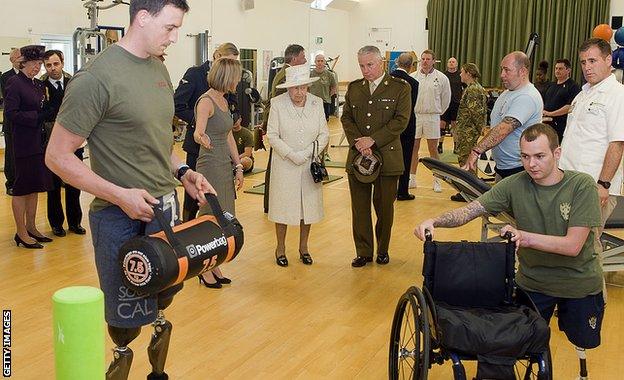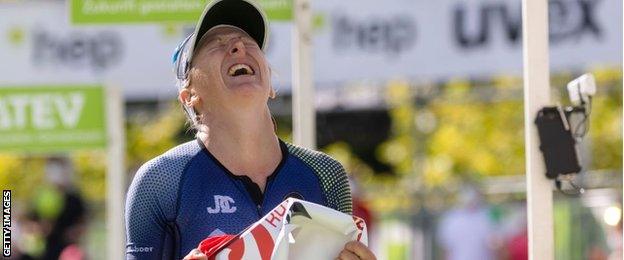Ironman World Championship: Kat Matthews on pain, gain and camaraderie as she bids for title
- Published

Kat Matthews will be making her Ironman World Championship debut this weekend
Kat Matthews is, in her words, "a data nerd".
That's fortunate because long-distance triathlon events spit out a blizzard of numbers.
Stroke rate, power output, running cadence, VO2 max, beats per minute. Each point plotted on a training plan. Every marginal gain explored over massive stints of endurance.
There isn't much call for "vibes".
That's because the Ironman distance - a 2.4-mile swim, 112-mile bike leg and full marathon - doesn't leave space for them. It demands precise preparation and delivers pitiless pain. A "mood" or "energy" alone will barely get you off the start line.
Yet the vibe is coming into play for this Saturday's Ironman World Championship, an event in which Britain's Matthews, who has a background as an Army physiotherapist, is making her debut.
For the first time since the inaugural event in 1978, the World Championship is not in Hawaii, the distance's birthplace and spiritual home.
Covid has forced a change. So instead of the South Pacific, the world's best will compete in Utah, swimming in a warm-water reservoir before riding and running along parched tarmac in the shadow of the state's sandstone stacks.
"It is a slightly different vibe to Hawaii," Matthews told BBC Sport.
"The course is more spread out; it isn't so concentrated on the town.
"I think that has been in the notion in some of the media that if it is not Hawaii, it is not proper.
"But everybody I have spoken to thinks it is fantastic.
"The course itself is so different, there are so many different sections to the bike course. It is not going to be straight time-trial style, it is going to be intense and technical.
"Then the run is three miles uphill, three miles downhill, for the full thing.
"Sometimes in Hawaii if you are a great swimmer or a great runner that can win you the race, where I think this course will reward the great triathletes."
Matthews, who took up the triathlon in 2015 and became a professional in 2019, is relatively new to Ironman, but has already made an impact.
She beat defending Ironman world champion Anne Haug by more than four minutes at a half-distance - Ironman 70.3 as they are known - event earlier this year.
In September, she was fourth at the Ironman 70.3 World Championship event round the same Utah course that will stage Saturday's race.
With German world number one Laura Philipp and British rival Lucy Charles-Barclay absent, Matthews is a leading contender.
"Honestly, I do feel in good shape," Matthews said.
"No-one ever has the perfect build-up to a world championship. There is always training load management that has to go on.
"But I have confidence that I must be in good shape after beating the world champion, someone who has been building to this world championship as well.
"I am actually quite excited to see what I am capable of."
Finding the outer limits of people's capabilities, and then stretching them a little further, is Matthews' speciality.
Despite being a professional triathlete, but she is still serving in, and supported by, the Army.
The 31-year-old's previous role was as a physiotherapist. She worked at Headley Court - a large stately home set in manicured gardens in Surrey, to where injured British servicemen and women returned from the frontline with life-changing injuries.

The rehabilitation work at Headley Court was visited by the Royal Family on many occasions
Matthews' task was to change their lives for the better, to return their movement and independence to them.
The sporting sphere is less serious, but she can apply the same principles to herself.
"On the physio side, you have pain, health and psychology and I use all of them on a daily basis, in partnership with my coach, understanding myself and my own pain management," Matthews said.
"There is a limit that only I know and I have to adapt on the day to what that is.
"Physio is essentially about rehabilitating people. I'm starting from a more ideal situation and attempting to get myself to that next level, beyond functional."
Finding a balance, between pain and gain, is going to be tricky over the next few weeks.
On 5 June, less than a month after this weekend's World Championships, Matthews is taking on the Sub7/Sub8 Project.
The idea is similar to Eliud Kipchoge's successful attempt to run a sub-two-hour marathon in 2019, and organisers hope that tweaking small details in the design of their triathlon course can lead to the elite breaking big barriers in terms of time.
For instance, there is a straight point-to-point swim leg in a man-made lake, a bike leg around a high-speed oval race track with banked turns, and a run with a team of pacemakers.
Matthews and Switzerland's Nicola Spirig will hope that the course, paired with ideal racing conditions, can take them through the Ironman distance in less than eight hours.
The current women's record for an Ironman is eight hours and 18 minutes 13 seconds, set by Britain's Chrissie Wellington in 2011.
Britain's two-time Olympic gold medallist Alistair Brownlee will be one of two male triathletes attempting to break seven hours on the same day.
The technology behind the bid is formidable, with aerodynamics tailor-made for each athlete.
But for Matthews, there is something else about the challenge and triathlon in general. Something that sounds suspiciously like vibes.
"It probably isn't as sexy," she explained, "but the networking and support from fellow athletes, as someone who has only been professional for a couple of years, is really important.
"There are definitely some individuals that don't want to play those games, who don't want to be involved in the camaraderie, which is fine, but from my perspective it is incredible, with the men helping the women, the women helping the men and professionals and amateurs being on the same level playing field."


Laura Siddall finished second in last year's Challenge Roth event
Matthews is one of seven Britons in the 29-strong women's professional field and not the only one with a military background.
Laura Siddall, 41, served a year as an officer in the Army, training at Sandhurst and working as part of the Royal Electrical and Mechanical Engineers.
"There is a huge focus in the military on sport and physical activity, building teamwork and leadership through them, but also that discipline as well," she said.
"If we were going a little bit deeper too, I think the element of problem-solving appeals. In a long-course race like we do, you really are problem solving as you go, making decisions about tactics as situations develop.
"It is not a war situation - it is not that extreme or serious, but it is still managing things on the fly and maybe the logical thinking we were trained in in the military carries over."
Siddall is one of 14 athletes in the field in Utah who are yet to qualify for the year's second World Championship, which will be staged back in Hawaii in October.
Eight competitors can qualify for Kona with their performance this weekend.
"Once I am on the run, I will try and work out quite who is where, but I don't think it will change my tactics early in the day," she said.
"I will try to control my race and be patient. It's a cliché, but I will try and focus on my own race."

Could an afternoon nap boost your memory?: Dr Michael Mosley looks at the benefits of a siesta
Did fame contribute to their deaths?: Legends Never Die explores what happened to three Gen Z hip-hop stars
